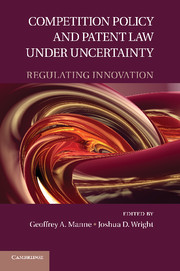Book contents
- Frontmatter
- Contents
- Contributors
- Introduction
- PART I THE INSTITUTIONS OF GROWTH
- PART II THE ECONOMICS OF INNOVATION
- PART III INNOVATION AND COMPETITION POLICY
- 6 Favoring Dynamic over Static Competition
- 7 Antitrust, Multidimensional Competition, and Innovation
- 8 American and European Monopolization Law
- PART IV THE PATENT SYSTEM
- PART V PROPERTY RIGHTS AND THE THEORY OF PATENT LAW
- PART VI INTELLECTUAL PROPRETY AND ANTITRUST: THE REGULATION OF STANDARD-SETTING ORGANIZATIONS
- Index
- References
8 - American and European Monopolization Law
A Doctrinal and Empirical Comparison
Published online by Cambridge University Press: 05 June 2012
- Frontmatter
- Contents
- Contributors
- Introduction
- PART I THE INSTITUTIONS OF GROWTH
- PART II THE ECONOMICS OF INNOVATION
- PART III INNOVATION AND COMPETITION POLICY
- 6 Favoring Dynamic over Static Competition
- 7 Antitrust, Multidimensional Competition, and Innovation
- 8 American and European Monopolization Law
- PART IV THE PATENT SYSTEM
- PART V PROPERTY RIGHTS AND THE THEORY OF PATENT LAW
- PART VI INTELLECTUAL PROPRETY AND ANTITRUST: THE REGULATION OF STANDARD-SETTING ORGANIZATIONS
- Index
- References
Summary
This chapter focuses on the differences between Article 82 and Section 2, reflecting largely on the American experience. We start with a discussion of the American experience and use that as a background from which to examine the European law on monopolies. American law is more conservative (less interventionist), reflecting the error-cost analysis that is increasingly common in American courts. The second half of this chapter provides an empirical comparison of the American and European regimes. Although a preliminary empirical examination suggests that the scope of a country's monopolization law is inversely related to its degree of trade dependence, the actual relationship between trade dependence and the scope of monopolization law appears to be an inverted U.
Introduction
Although there are more than 100 competition law regimes around the world, the United States and the European Union are by far the most important. Both systems have laws constraining the conduct of monopoly firms. In the United States this part of competition law is called monopolization law, while in the EU it is called dominance law. We will use the terms interchangeably here. This chapter will survey the doctrinal differences and empirically examine the determinants of monopolization law in the United States and the EU.
In the United States, the law governing monopolies is provided by Section 2 of the Sherman Act and the judicial opinions interpreting it. In the EU, monopolization law is provided by Article 82 of the European Community Treaty and related case law.
- Type
- Chapter
- Information
- Competition Policy and Patent Law under UncertaintyRegulating Innovation, pp. 252 - 284Publisher: Cambridge University PressPrint publication year: 2011



